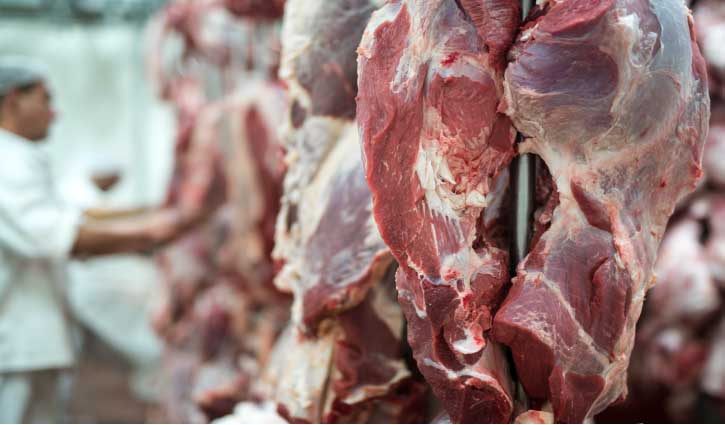Beef prices may spike much due to new import restrictions, say meat importers
Asif Showkat Kallol || BusinessInsider

Representational collected image
A number of major factors have led to beef being the most expensive meat in Bangladesh in the region of South Asia.
Local meat importers are worried that the price of meat will rise further from Tk 620 (low quality meat with bone and chubby) per kg to Tk 1,000 after levying 20 percent supplementary duty and five dollars’ worth tariff value on a kilogram.
The lower and lower middle class families will not be having sufficient protein intake as the price of meat gets higher.
The General Secretary of Bangladesh Meat Importers and Traders Association, Mohammad Amjad Hossain, sent a letter to outgoing senior finance secretary Abdur Rouf Talukder, a few days ago, notifying him of his concerns.
The association has demanded the withdrawal of supplementary duties and cut in tariff value to $ 2.8 on per kg imported meat, especially from India and 13 other countries, i.e., Ethiopia, France, Korea, Thailand, China, United Arab Emirates, USA, Pakistan, Malaysia, Singapore and Indonesia, respectively.
Currently, Bangladesh imports meat worth $2.5 million from 14 countries and is planning to allow beef imports from Brazil, too. However, that possibility is contested by the local industry.
Senior Commerce Secretary Tapan Kanti Ghosh told the Business Insider Bangladesh that the decision to restrict import of meat came from different stakeholders.
An official not preferred to be quoted, said local beef producers want an import ban on frozen meat as the government imposed supplementary and tariff value duties following ‘the country's self-sufficiency in meat production.’
The country produced 7.51 million tonnes of meat in FY 2018-19 against an annual demand of nearly 7.3 million tonnes, according to the Department of Livestock Services. Now, the government is ready to restrict the import of meat as the cattle-rearing groups have raised their voices for import ban. Over the last 7 years, meat imports have increased about 4 times in value, from $0.7 million to $2.5 million driven by hospitality sector demand.
During the Eid-ul-Fitr, the price of beef hovered around Tk 750-850 per kilogram, which was Tk 600 per kg even in March, a month before.
But now, butchers are retailing beef for Tk 700-750 per kg in Dhaka, while mutton costs anywhere from Tk 850-1,000 per kg. To put things into perspective, highly prized Australian angus beef retails for $4.90 or Tk 400 per kg.
In the Indian city of Kolkata, the price of buffalo meat is Rs200-230 per kg, which is approximately Tk235-270 in Bangladeshi Taka, said a Bangladeshi diplomat in Kolkata.
Mutton costs Rs 700 per kg there, which is approximately Tk 820 in Bangladesh.
As Muslims in Kolkata usually consume beef, the price of beef is cheaper compared to the price of mutton there, according to media report.
In Pakistan, the price of a kg of beef is around Rs 825, which is equivalent to Tk 400 in Bangladesh, and price of mutton per kg is Rs 1,340, equivalent to Tk 650, said Mostofa Jamil, first secretary of the Bangladesh High Commission in Islamabad.
The average price of per kg beef in the international market is around $5- $5.50, but in Bangladesh it is around $7-$7.50, according to the Bangladesh Dairy Farmers' Association (BDFA).
Before India put a ban on export of cattle heads to Bangladesh in 2014, the price of one kg beef was around Tk230 to Tk 250 in Dhaka’s market, according to official data.
Prior to the ban of beef a few years ago, smuggled Indian bulls used to meet a substantial portion of Bangladesh's demand. An estimate showed that traders engaged in smuggling brought nearly 2 million bulls into Bangladesh.
The global average price of beef was $4.63 in FY15 — about Tk360 per kg based on Bangladesh Bank's exchange rate at that time.
























